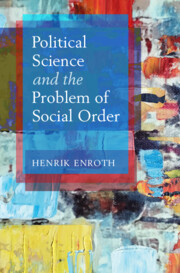‘What holds society together? This book shows how political scientists across the twentieth century answered this question – and also how, at least sometimes, they avoided confronting it directly, sublimating controversial theories of social order into conceptual presuppositions. Both masterful storyteller and incisive critic, Enroth has a knack for the accessible presentation of ideas in ways that do not flatten their complexity, capturing their strengths and their vulnerabilities with enviable economy, elegance, and wit.'
Patchen Markell - Cornell University
‘In this lucid and erudite book, Henrik Enroth shows how modern political science has wrestled with the problem of social order from its inception, and how a range of ultimately incoherent solutions to this problem have animated political inquiry ever since. From this Enroth distills a lesson of great value to all political scientists: that social order cannot be taken for granted, but that its creation should constitute a topic of inquiry in its own right.'
Jens Bartelson - Lund University
‘This book offers a new angle on the discipline of political science. The author argues that, although 'the problem of social order' has been central to debates in political science from the early twentieth century onwards, the centrality of this problem has rarely been recognized as such. Consequentially, political science tends to keep, with relatively minor variations, addressing a problem that cannot be solved. Enroth's arguments are convincingly presented and well argued. A pleasure to read.'
Peter Wagner - Universitat de Barcelona, School of Sociology
‘Enroth's sweeping panorama is exciting in its intellectual ambition and persuasive in its analytical clarity. It is at once a revisionist history of political science and a probing investigation of contemporary modernity.'
Jeffrey Alexander - Yale University
‘… an important, welcome addition to the still-growing literature on the history of political science and should soon find itself at the center of discussions about the discipline, its problems, and its competing or complementary histories.’
James Farr
Source: Perspectives on Politics
‘A compelling perspective on the historical and intellectual changes within the political science discipline. … Highly recommended.’
M. J. Dudas
Source: Choice



